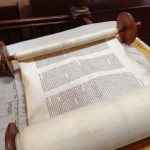#40 Theology: God in Judaism
#40 Theology: God in Judaism
 In this lesson you will explore God in Judaism. You will learn the names of God in the Torah, the Jewish idea of God, and the God in Jewish prayer. You will explore questions like: “What does God look like, what does God do, where is God?”
In this lesson you will explore God in Judaism. You will learn the names of God in the Torah, the Jewish idea of God, and the God in Jewish prayer. You will explore questions like: “What does God look like, what does God do, where is God?”
#1 KNOW THIS: Useful Vocabulary
Theology: The study of God
Monotheism: The belief in One God
Polytheism: The belief in Many Gods
Names of The One Jewish God: Yahweh, Elohim, Adonai, Adonai Eloheinu, HaMakom, HaShem, and the list goes on . . . .
#2. STUDY THIS: The Shema, Jewish statement of Monotheism (One God).
Shema Yisrael Adonai Eloheinu, Adonai Echad. “Listen Israel, Our God is One”
– Deuteronomy, 6:4
Listen to the Shema + V’havtah
#3. WATCH. Enjoy this song about Shema performed by Anna Brooks
#4 READ: Two quotes on Creation from The Torah
 “God created human beings in the Divine Image”
“God created human beings in the Divine Image”
-Genesis 1:27
“And God saw all that was created and it was very good”
-Genesis 1:31
#5: WATCH : God’s Creation courtesy of The BBC
#6 STUDY THIS: The Jewish Covenant with God
In the Torah (Genesis Chapter 9), it teaches that God established a covenant with the people. A covenant is like a contract, it suggests that God has a role and people have a role in the “contract” or divine covenant. The belief is that if people behave well, act kindly, do right, than God will also play God’s part.
Question: In the covenant between God and People, what do you think God’s part is? What do you think our part is?
#7 RESPOND AND REACT
1. What is the Shema?
2. What are the different names of the One Jewish God?
3. How can One God have more that one name?
4. When you recite the Shema, what does it feel like and what does it mean to you?
5. What does it mean that God created human beings in the Divine Image?
6. In the covenant between God and People, what do you think God’s part is? What do you think our part is?
Need some help?
We’re here for you. At any time, if you have any questions, please contact one of our teachers so we can help you.
Also, at the end of the session, remember to review your responses in your Tamid Workbook so you can get credit for this lesson. Behatzlacha (Hebrew for good luck)!
You can reach us at (646)360-0689 or connect@tamidnyc.org
